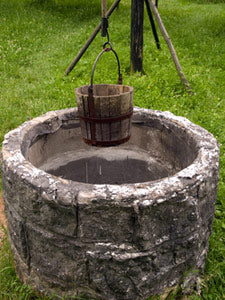For most people, their drinking water is regulated by federal and state governments since they receive their water through community supplies. However, about 15% of Americans have their own source of water, through a private well or springs on their property. The government does not regulate these water sources, and therefore, homeowners need to pay closer attention to the safety of their drinking water.

Most groundwater is dubbed safe, but people should have it tested periodically. Groundwater that fills wells can sometimes become contaminated by man-made products such as gasoline, oil, road salts, and chemicals, although the deeper the well, the less likely it is to be ridden with bad things. Ground water can pick up elements from the rock when it passes through. Run-off pollutants can also seep into groundwater. Things like microorganisms, heavy metals, lead, copper, household waste, fluoride and more can all be found in traces in ground water.
The Safe Drinking Water Act of 1974 does not include private wells. However, looking at the requirements for that on the EPA website can give well-owners an idea of what the acceptable levels are for these many contaminants. Local health departments are also very helpful in providing information and assistance with well testing. Even some local college with environmental science programs can sometimes aid in testing water quality.
A number of factors to maintain a healthy private well need to be addressed in order before you can rely on it to provide ‘clean’ water.
- Construction: Was the well built soundly? If the foundation is not strong, problems could develop at any time.
- Location: Where is it located? What problems have your neighbors experienced? What is nearby that could cause a problem?
- Maintenance: How well has the well been maintained in the past few years? Has the water been periodically checked for contamination?
- Water Source: What is the quality of the aquifer from which your water is drawn?
- Human activities: What is going on in your area that could affect your well?
Human activities can greatly contaminate the groundwater which will end up in your well water. The EPA recommends that septic tanks and livestock yards be 50 feet away from the wall. Petroleum, manure storage, pesticides and fertilizer storage should be even further away at 100 feet.
It is important to test your well for pesticides, heavy metals, and organic chemicals before you use the water for the first time. Also, annual tests for nitrate and coliform bacteria should be done annually, especially in areas without sewers. If you use a private laboratory to conduct the testing, nitrate and bacteria samples will typically cost between $10 and $20 to complete. Testing for other contaminants will be more expensive, such as testing for pesticides or organic chemicals-- they can cost from several hundred to several thousand dollars. As we mentioned earlier, be sure to check with local health departments or local colleges with environmental science programs to see if help is available to ease the cost.
Several sources of pollution are easy to detect just by standing, smelling, and hearing what is nearby. Knowing what types of problems you face will help determine what kind of tests you need. However, underground water contamination can occur at any time and yearly testing may not be adequate anymore. In short, we do not recommend drinking water directly from your wells without any filtration/ protection, due to industrial contamination nowadays. We highly recommend that homeowners test their well water every 3-4 months to make sure they have safe drinking water, before consumption. After all, you OWN your well. So, you have the chance to always know what is in your water and can control the safety- without having to wait for a private company to tell you too late the water has a bug! Test frequently especially when you think there could be a problem. Otherwise, drink away.
Of course, it never hurts to play it safe and give yourself extra peace of mind by installing a water filtration system in your home. Having a well may require a lot of effort at first and may be overwhelming but it may be easier to take things to step by step. It is important to deal with this situation with caution and always remember that a properly maintained well can provide you and your family with safe water for a lifetime. Stay positive, there is always a solution for every situation!



